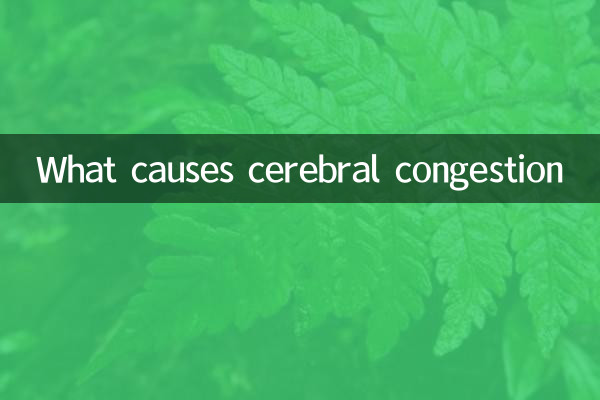What causes cerebral congestion
In recent years, with the improvement of health awareness, the health problem of cerebral congestion has gradually attracted widespread attention. Cerebral congestion, also known as cerebral congestion or cerebrovascular congestion, is an abnormally increased amount of blood in the blood vessels of the brain, which can lead to headaches, dizziness, and even more serious health problems. So, what exactly causes cerebral congestion? This article will analyze its causes from multiple angles and provide you with a detailed answer based on hot topics and hot content in the past 10 days.
1. Common causes of cerebral congestion

There are many causes of cerebral congestion, mainly including the following aspects:
| Cause | Specific instructions |
|---|---|
| hypertension | Long-term hypertension can cause increased pressure in cerebral blood vessels and damage to blood vessel walls, leading to cerebral congestion. |
| emotional | Strong emotions such as anger and anxiety can stimulate sympathetic nerves, causing blood vessels to constrict and increase blood pressure. |
| overworked | Working for long periods of time or lacking rest can put the brain in a state of tension and increase blood flow to the brain. |
| Improper diet | High-salt and high-fat diets will increase the burden on blood vessels and induce cerebral congestion. |
| climatic factors | Extreme weather (such as high temperature or cold) may affect vasomotor function and cause cerebral congestion. |
2. The correlation between hot topics in the past 10 days and cerebral congestion
Recently, the following hot topics are closely related to the discussion of cerebral congestion:
1.Hot weather and health risks: High temperatures persist in many places. Experts remind that high temperatures can easily cause cerebrovascular diseases, including cerebral congestion. It is recommended to avoid prolonged activities under the hot sun and replenish water in time.
2.Workplace stress and mental health: Discussions on the "996 work system" have heated up again on social media, with overwork and emotional stress considered to be potential causes of cerebral congestion.
3.Diet and Health Trends: Low-salt and plant-based diets are a hot topic, which fits well with health recommendations to prevent cerebral congestion.
3. How to prevent cerebral congestion?
Preventing cerebral congestion requires starting from lifestyle. Here are some suggestions:
| Precautions | Specific methods |
|---|---|
| control blood pressure | Monitor blood pressure regularly and take antihypertensive medications as directed by your doctor. |
| Eat properly | Reduce salt and fat intake and eat more fruits and vegetables. |
| moderate exercise | Perform aerobic exercise, such as walking and swimming, 3-5 times a week. |
| manage emotions | Relieve stress through meditation and deep breathing. |
| Get enough sleep | Ensure 7-8 hours of sleep every day. |
4. Emergency treatment of cerebral congestion
If symptoms of cerebral congestion occur (such as severe headache, nausea, blurred vision), the following measures should be taken immediately:
1. Stay quiet and avoid moving the patient.
2. Call the emergency number and wait for professional medical assistance.
3. If the patient is conscious, he can be placed in a semi-sitting position with his head elevated.
Conclusion
Cerebral congestion is a health problem that requires attention, and its causes are complex and diverse. By understanding the causes, paying attention to popular health topics, and taking scientific preventive measures, we can effectively reduce the risk of cerebral congestion. If you or someone around you develops related symptoms, please seek medical treatment promptly to avoid delaying treatment.

check the details

check the details